#from the baserri
Explore tagged Tumblr posts
Text
While passing a little free library I picked up a novel which caught my eye: Ceremony by Leslie Marmo Silko. I flipped to a random place in the story and was pleasantly surprised by the following page:
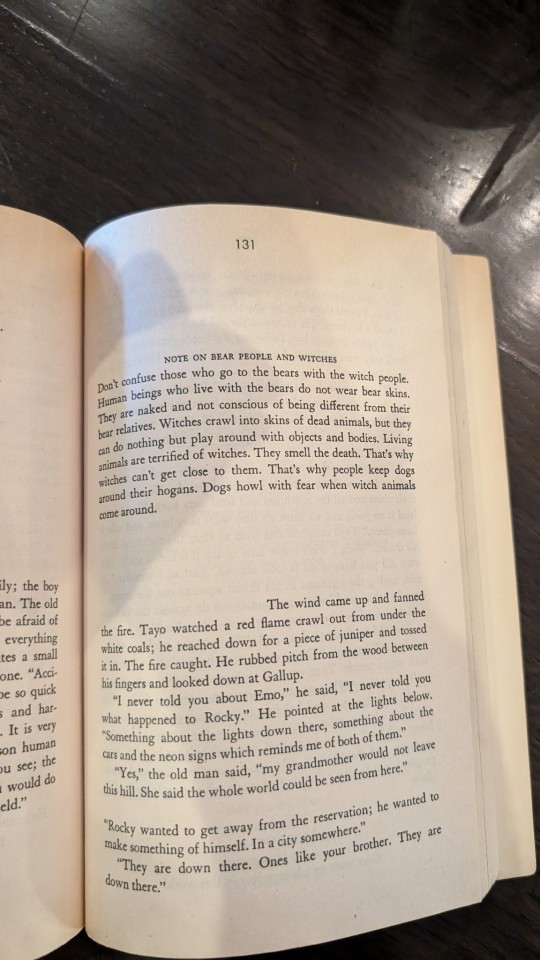
I'm now reading the story cover to cover, immediately immersed in Silko's literary voice.
51 notes
·
View notes
Note
5, 7, 14, 27 <3<3
Thank you for helping me procrastinate 😔
5. Languages do you speak with your friends
Unfortunately it’s like 99.9% English :(((( I do have one friend who I occasionally message in Amharic but I don’t really speak it so idk if that counts, also idk whether the people who come to all the Catalan stuff at school are my friends??? but they are nice and we always speak in Catalan (I have no idea who to include as my friends at all ever)
7. Favorite food from the country that speaks your target language
For Catalan, idk, I like crema de carbassó (which I don’t think is strictly Catalan but whatever), and also crema catalana is yummy! I’m not sure what else, I feel like there were more things. In the Basque Country I got to have idiazabal with sagardultzia which was very yummy and also fancy and I feel like I must appreciate the fact that I got to have it for desert like every day because the farm I was on made idiazabal (also I helped make the sagardultzia!). For Kerala I think my favorite food is dosas although I think those are actually Tamil but once again whatever. And for Wales it’s Welshcakes!
14. Favourite book in target language
Oh aaaaaaa not sure....Catalan is the only one I have read enough books in to have opinions so I’ll just do that, I really liked La pell de la frontera tbh. Also I only read some things from it but Flors i viatges by Mercè Rodoreda.
27. Favourite pet name in any language you know
sdfhjsdhfjkhsf no idea, I think habibi is the best one, also I like carinyo but only sarcastically?? and I’m also a fan of cariad in Welsh. Also maitia, I think it’s really cute <33 And aslanım in Turkish too
#all these pet names are like.....mom/grandma pet names#like the mom at the baserri where i was staying would say maitia#also i only know aslanım from watching muhteşim yüzyil shdfksdhfh#the cursed lore emerges#eskerrik asko galderengatik <333#oso dibertigarriak ziren#asks
4 notes
·
View notes
Note
For the kisses: "A lingering kiss before a long trip apart. for Nora and Mason" maybe? Or "An awkward kiss given after a first date." for whomever it fits best! :)
This took so long, I'm so sorry! Writer's block, my detested, but here it is
46. A lingering kiss before a long trip apart
“You know, you could just admit that you are going to miss me,” said Nora.
She was kneeling on the floor of her bedroom next to her open suitcase, which was already overflowing, trying to fit as many sweaters as possible in such a small space. She would be gone only two weeks for Christmas to visit her grandparents back in Spain. She had explained to Felix all the traditions she remembered from her childhood, and Mason couldn’t understand how she could be so excited about all those family reunions, meals and parties. He thought she was on his side when talking about big gatherings of loud people.
“I would never lie to you, sweetheart,” he replied from her bed, from where he had been watching her frustration slowly grow.
“It’s okay, sunshine.” Like every time she called him that, the word had a taste of sarcasm and affection that made him smirk in return. “I’ll keep the secret.”
“At this point, I’ll be happy if you can keep your things inside that suitcase.”
But she didn’t answer. She had to focus her whole being into closing the damn thing.
It was true, though, that Mason never lied. He didn’t know if he would miss her, not exactly. He never had any issues partying ways with a fling, but, of course, Nora was different. She was coming back. He couldn’t say he would be sitting around, waiting like a sad puppy; that was more Felix’s territory, and even Nate’s, to an extent. If Mason had to be honest, he didn’t know what would happen in those two weeks. Nora’s life had become so intertwined with theirs that it wouldn’t be easy to walk around her absence, he supposed. They all relied a bit of themselves on her. He didn’t remember a day in the last few weeks when he wasn’t close to her.
“Okay, I think I’m done.”
Mason stared at the suitcase, about to burst open again. He shrugged and got up.
“You’re bringing that down on your own.”
“What?” she turned to him, “but you are a vampire! Super strong, super fast…”
“I’m also driving you to the airport. Don’t push your luck.”
She continued to grumble all the way to the Agency car while Mason followed behind, an unlit cigarette hanging from his lips. He did find an ounce of sympathy for her struggling, just enough to lift the suitcase to the trunk.
Nora had gotten used to being quiet in the car with him. No music, no conversation; she usually appreciated the silence herself. That particular day, however, she was having a hard time to keep her excitement to herself. She hadn’t talked much about her family up to that point. They had been able to piece some things together, but there was never enough to satisfy Felix or Nate’s curiosity. Mason, on the other hand, knew that if Nora had wanted them to know, she would have already told them. So he didn’t ask, not because he didn’t want to know (even thought he would never admit it out loud), but because he respected the way Nora wanted to approach the difficult topic that was her family and her childhood. Behind all the jokes and the façade of indifference, Mason could always see a sliver of the nostalgia that Nora never talked about. Until that moment, of course, when she was talking about all those people Mason had never heard about. There were many little stories distorted by the magic of the years that had passed. He could almost picture himself in the kitchen of that place.
“You know, I think you would like it.”
He lifted an eyebrow, his eyes still fixed on the road.
“I don’t mean now, at Christmas. Just the place. It doesn’t get too hot or too sunny. There’s a lot of space to be on your own. No one ever walks by, it could be days before you see another person. It’s the perfect place for you.”
“Invite me to the villa when it isn’t full of people.”
“A baserri, not a villa. It isn’t fancy,” she corrected him with a smile.
“It sounds fancy to me.”
“It’s an old house. Older than you, even.”
“I’m turning the car around.”
Her cheery laugh filled the car. He hadn’t ever seen her like that, as if she had dropped a mask she had forgotten she was wearing.
“I’m excited to be back, you know. It’s been a while.”
Mason let her ramble for a while, surprising himself with the curiosity bubbling in him. He had no interest in any festivities or family disputes, but he couldn’t stop himself from asking questions from time to time. There weren’t many times when Nora was that open and honest about herself, and, at that moment, Mason found himself enjoying that new side of her, like a heavy weight had lifted from her shoulders. He let her talk for the whole ride.
Nora was out of the door almost before he stopped the car, jumping to get her suitcase and her bag. He groaned but didn’t comment on it. He just silently watched her go through every pocket, listing out loud everything she had on her.
“A bit late if you forgot anything. Let's go.”
Mason took the heavy suitcase to force her to follow him, but the bright lights and the sudden booming voices stopped him in his tracks by the door.
“Hey, you can go if you want. This is honestly hell for me, I know it won’t be fun for you.”
Mason looked around them, into an ocean of stumbling, loud people. He took her bag from her shoulder and started walking again.
“I swear I haven’t ever met anyone as stubborn as you.” The way Nora said it made it sound like a compliment.
“You should try and look in a mirror.”
“I do it quite often, thank you,” she announced proudly, even though she was having a hard time matching his long stride.
They were soon at the control, or, more precisely, at the end of the long queue leading to it.
“This is me! Can I have my things now, please?”
She took everything from him without too much opposition on his side, aside from a barely hidden chuckle when the suitcase hit the floor with a loud thump.
“You are such a gentleman. See you in two weeks?” she grinned, as she started to walk away.
“Wait, that’s it? I’ll drive you here and that’s all I get?”
“Weren’t you doing this from the goodness of your heart?” The grin had turned into a smirk. He could work with that.
“You’ll be away for two weeks. I should have something to remember you by.”
She let her backpack slip onto the floor when she reached up to grab his shirt. She gently caressed his cheek with her other hand as their lips met in a slow kiss, completely different from any of the ones they shared before. The passion was there, but none of the rush, the hunger, the biting intensity that usually led them to one of their bedrooms. It was a soft kiss, full of all those strange, new feelings that Mason couldn’t put into words. Two weeks were a long time for two people who had barely been apart since they met. The month after their first mission had been an exhilarating wait; half that time now would be an excruciating pain.
“Don’t worry,” she whispered against his lips when they finally broke apart, “I’ll keep your secret.”
Coming from anyone else, he would have groaned and walked away. Then, however, he stayed. His eyes never left her until she waved at him and disappeared into the crowd. As soon as she was out of sight, the yelling, the rattling baggages, the loudspeakers, every tiny movement rushed back to him at full effect, leaving him disoriented and a little shaken by the sudden aching. He hurried back to the car, where the smell of Nora’s shampoo still lingered in the air. Damn, he was going to miss her.
#also it's barely edited because if i waited to be ready for that it would be another month#so sorry for that too#sara writes#nora zelaya#nora x mason
8 notes
·
View notes
Text
Exspaining Spain: regions
Basque Country (País Vasco/Euskadi)

The Basque Country has three provinces, Álava (Araba/Álava), Biscay (Bizkaia/Vizcaya), and Gipuzkoa (Gipuzkoa/Guipúzcoa). The de facto capital city is Vitoria-Gasteiz, as the institutional headquarters are located there.

Architecture
The traditional construction of the region is the caserío or baserri, characterized by its stone walls, gabled, tiled roof, and an arched entry that leads to an open portico. There are usually barns and stables on the first floor.

Climate
The predominant climate type is the oceanic one, characterized by cool summers and winters. There is a lot of rainfall all year round. The average temperature throughout the year is 10.4 °C (50.7 ºF).
Economy
Industry continues to be the most important sector, and the region is known for its steel, aeronautics, and energy production.

The Basque Country is the richest autonomous community in Spain in terms of per capita income.
Famous people
Blas de Lezo - naval strategist
Cristóbal Balenciaga - fashion designer
Elena Arzak - chef
Fernando Savater - philosopher
Francisco de Vitoria - philosopher
Ignatius of Loyola - priest and theologian
Jon Kortajarena - model
Juan Sebastián Elcano - explorer
Miguel de Unamuno - writer
Paco Rabanne - fashion designer
Xabi Alonso - soccer player
Gastronomy
The Basque diet is based on meat, fish, seafood, stews, vegetables, legumes, and cider. Typical dishes include bacalao al Pil-Pil (salt cod), cuajada (a cheese product), kokotxas (fish stew), marmitako (tuna pot), pintxos (tapas), and txipirones (baby squid).

Cuajada

Pintxos
History
8th century BCE - Urnfield and Hallstatt cultures
1st century BCE - Roman conquest
409 CE - Vandals, Alans, and Suebi
416 - Visigoths
8th century - Franks
844 - Vikings
1076 - creation of the Kingdom of Navarre, which included the Basque Country
1199 - Castile invaded and annexed part of the Basque Country
1833-1840, 1846-1849, 1872-1876 - Carlist Wars
1979 - Statute of Autonomy
Languages
Basque and Spanish are the official languages. Basque has adopted many words from Latin, Spanish, and Gascon, which is a dialect of Occitan.
Monuments and landmarks
There are two UNESCO World Heritage Sites: Cave of Altamira and Paleolithic Cave Art of Northern Spain (shared with other regions of Spain) and Vizcaya Bridge (Biscay).
Other landmarks include the Cathedral of Santa María (Álava), the Guggenheim Museum (Biscay), Mount Urgull (Gipuzkoa), and the Urdaibai Biosphere Reserve (Biscay).

Vizcaya Bridge

Guggenheim Museum
79 notes
·
View notes
Text
History of the Basques: Modernity
Basques in the present-day Spanish and French districts of the Basque Country managed to retain a large degree of self-government within their respective districts, practically functioning initially as separate nation-states. The western Basques managed to confirm their home rule at the end of the Kingdom of Castile's civil wars, pledging an oath to claimant Isabella I of Castile in exchange for generous terms in overseas trade. Their fueros recognised separate laws, taxation and courts in each district. As the Middle Ages drew to a close, the Basques got sandwiched between two rising superpowers after the Spanish conquest of Iberian Navarre, i.e. France and Spain. Sea influence: The Basques (or Biscaynes), especially proper Biscayans Gipuzkoans and Lapurdians, thrived on whale hunting, shipbuilding, iron exportation to England, and trade with northern Europe and America during the 16th century, at which time the Basques became the masters not only of whaling but the Atlantic Ocean. However, King Philip II of Spain's failed Armada Invencible endeavour in 1588, largely relying on heavy whaling and trade galleons confiscated to the reluctant Basques, proved disastrous. The Spanish defeat triggered the immediate collapse of Basque supremacy over the oceans and the rise of English hegemony.[39] As whaling declined privateering soared. Many Basques found in the Castilian-Spanish Empire an opportunity to promote their social position and venture to America to make a living and sometimes amass a little fortune that spurred the foundation of the present-day baserris. Basques serving under the Spanish flag became renowned sailors, and many of them were among the first Europeans to reach America. For example, Christopher Columbus's first expedition to the New World was partially manned by Basques, the Santa Maria vessel was made in Basque shipyards, and the owner, Juan de la Cosa, may have been a Basque. A Basque trade area: The Basques initially welcomed Philip V to the Crown of Castile (1700), but the absolutist outlook inherited from his grandfather could hardly withstand the test of the Basque contractual system. The 1713 Treaty of Utrecht and the 1714 suppression of home rule in the Kingdom of Aragon and Catalonia disquieted the Basques. It did not take long until the Spanish king, attempted to enlarge his tax revenue and foster a Spanish internal market by meddling in the Basque low-tax trade area and moving Basque customs from the Ebro to the coast and the Pyrenees. With their overseas and customary cross-Pyrenean trade—and by extension home rule—under threat, the royal advance was responded by the western Basques with a trail of matxinadas, or uprisings, that shook 30 towns in coastal areas (Biscay, Gipuzkoa). Spanish troops were sent over, and the widespread rebellion quelled in blood. A pardon to the leaders of the rebellion in 1726 paved the way to an understanding of the Basque regional governments with Madrid officials, and the ensuing foundation of the Royal Guipuzcoan Company of Caracas in 1728. The Guipuzcoan Company greatly added to the prosperity of the Basque districts, by exporting iron commodities and importing products such as cacao, tobacco, and hides. The Basque districts in Spain kept operating virtually as independent republics. Emigration to America did not stop, with Basques—reputed for their close solidarity bonds, high organizational skills and an industrious disposition—found venturing into Upper California at the head of the early expeditions. By the end of the 18th century the Basques were deprived of their customary trade with America and choked by the Spanish disproportionately high customs duties in the Ebro river, but at least enjoyed a fluent internal market and intensive trade with France. On a positive note the Spanish customs exactions imposed over the Ebro favoured a more European orientation and the circulation of innovative ideas—labelled by many in Spain as "un-Spanish"—both technical and humanistic, such as Rousseau's 'social contract', hailed especially by the Basque liberals, who widely supported home rule (fueros). Cross-Pyrenean contacts among Basque scholars and public personalities also intensified, increasing awareness of a common identity beyond district specific practices. Revolution and war: Self-government in the northern Basque Country came to an abrupt end when the French Revolution centralized government and abolished the region specific powers recognized by the ancien régime. The French political design intently pursued a dissolution of the Basque identity into a new French nation, and in 1793 that French national ideal was enforced with terror over the population. The Southern Basque Country was mired in constant disputes with the royal Spanish authority. During the War of the Pyrenees and the Peninsular War, the impending threat to the self-government on the part of the Spanish royal authority was critical for war events and alliances First Carlist War and the end of the fueros: Fearing that they would lose their self-government (fueros) under a modern, liberal Spanish constitution, Basques in Spain rushed to join the traditionalist army led the charismatic Basque commander Tomas de Zumalacarregui, and financed largely by the governments of the Basque districts. The opposing Isabeline Army had the vital support of British, French (notably the Algerian legion) and Portuguese forces, and the backing of these governments. However, the Carlist ideology was not in itself prone to stand up for the Basque specific institutions, traditions, and identity, but royal absolutism and Church, thriving in rural based environments and totally opposed to modern liberal ideas. They presented themselves as true Spaniards, and contributed to the Spanish centralizing drive. Despite the circumstances and their Catholicism, many Basques came to think that staunch conservatism was not leading them anywhere. Customs were then definitely moved from the Ebro river over to the coast and the Pyrenees, which destroyed the formerly lucrative Bayonne-Pamplona trade and much of the region's prosperity. The dismantling of the native political system had severe consequences throughout the Basque Country, leaving many families struggling to survive after the enforcement of the French Civil Code in the continental Basque region. The French legal arrangement deprived many families of their customary common lands and had their family property divided. The new political design triggered also cross-border smuggling, and French Basques emigrated to the USA and other American destinations in large numbers. They account for about half of the total emigration from France during the 19th century, estimated at 50.000 to 100.000 inhabitants. Iron and mining: The centuries long forge (ironwork) network linked to readily available timber, abundant waterways, and proximity of coastal harbours saw its final agony, but some kept operating—north of Navarre, Gipuzkoa, Biscay. A critical moment for the development of heavy metal industry came with the introduction in 1855 of Bessemer blast furnaces for the mass-production of steel in the Bilbao area. In 1863 the Regional Council of Biscay liberalized the exportation of iron ore, and in the same year the first mining railway line was pressed into operation. A rapid development followed, encouraged by a dynamic local bourgeoisie, coastal location, availability of technical know-how, an inflow of foreign steel industry investors—partnering with a local family owned group Ybarra y Cía—as well as Spanish and foreign high demand for iron ore. The transfer of the Spanish customs border from the southern boundary of the Basque Country to the Spanish-French border ultimately encouraged the inclusion of Spain's Basque districts in a new Spanish market, the protectionism of which favoured in that respect the birth and growth of Basque industry. 3rd Carlist war: the rising Spanish Prime Minister Canovas del Castillo stated that no agreement bound him, and went on to decree the "Act for the Abolition of the Basque Charters", with its 1st article proclaiming the "duties the political Constitution has always imposed on all the Spanish." The Basque districts in Spain including Navarre lost their sovereignty and were assimilated to the Spanish provinces, still preserving a small set of prerogatives (the Basque Economic Agreements, and the 1841 Compromise Act for Navarre).
1 note
·
View note
Photo
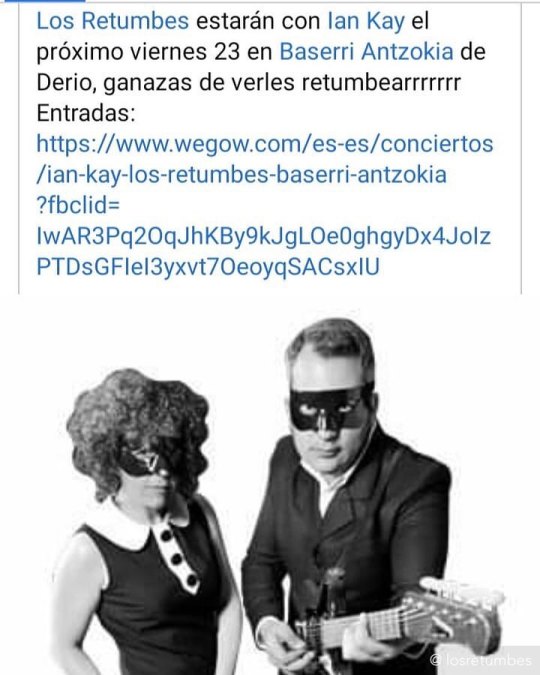
Repost from @losretumbes En 15 días RETUMBAMOS🥁🎸 Con Ian Kay en Baserri Antzokia💥💥💥 Enlace para pillar entradas⬇️⬇️ @iankaymusic @baserriantzokia #losretumbes #lamaracadebaraka #garagepunk https://www.instagram.com/p/CNbBnMurC6k/?igshid=wjfsf33wuhl9
0 notes
Text
Lina’s Legacy

“To know how to eat is to know enough.” Old Basque Saying
I received as a gift the cookbook Basque Country by Marti Buckley. It’s a sumptuous book, filled not only with wonderful recipes, but also information about the Basque region, it’s people and culture. And so many wonderful illustrations! Luscious food photos. Pictures of Basque country hillsides and vineyards, village streets and stone baserri, colorful fishing boats and crowded cafés, men in berets. I want to cook all those foods, I want to eat all those foods!
Lina loved to cook. My earliest childhood memories are of her kitchen, filled with warmth and so many delightful smells. She wore a white apron over her dress, dark hair pinned up, sandaled feet. She was busily stirring a simmering pot on the stove, checking a roast in the oven, slicing mushrooms at the counter, squeezing fresh garlic in the press.
When we would wander into her kitchen and ask, “What’s for dinner grand-mére?” her answer was always, “bexin-goxua.” Is that even a word? Is it Basque? How do you really spell it?
Her culinary creations were truly delicious: simple soups of cabbage or split peas, traditional salted cod and potatoes drenched in garlic and parsley, steamed artichokes with vinaigrette, roasts of lamb or beef or pork, casseroles of aubergine and tomatoes, escargot in curling shells, sides of fresh mustard greens, harticots verts, or peas cooked in a head of lettuce. She made her own fig jam and bouquet garni with ingredients from her garden. Her turkey stuffing is legendary, made with roasted chestnuts, fresh sage and brandy, it is served in all our homes each year on Thanksgiving.

She made some unusual dishes: calves’ hearts sautéed in bacon, fragrant kidney stew, garlicky pig’s feet soup, braised beef tongue, liver and onions and, my favorite, ris du veau, calf glands simmered in a sauce of wine, mushrooms and cream. The village girl in her appreciated all cuts of meat.

There were homemade desserts: Crème Carmel from her double boiler, light puff pastry filled whipped crème, spongy ladyfinger cake with pineapple, cinnamon-y rice pudding.
I was so little in those cooking days… I loved to sit on the stool and watch, happy to be offered tastes. I wish I’d paid better attention.
“You add salt to taste,” she told me pouring it into her palm, unmeasured, then brushing it into the pot.
“Salad dressing is one-part red vinegar and two-parts olive oil.” She stirred them in bowl, adding garlic and seasoning, then poured it over butter lettuce, to be served at the end of the meal.
She once told me, “The mark of a good cook is a clean kitchen.”
So, I always clean up as I cook. Not sure it makes my food taste better, but it ties my apron strings to Lina’s.

0 notes
Video
youtube
Places to see in ( Getaria - Spain ) Getaria is a coastal town located in the province of Gipuzkoa, in the autonomous community of Basque Country, in the North of Spain. This coastal village of Getaria is located on the Urola Coast, with Zarautz to the east and Zumaia to the west. Getaria is known for being Juan Sebastián Elcano’s hometown, a seaman well-known for being the first man to circumnavigate the earth. He was captain of the Nao Victoria, the one ship in Magellan's ill-fated fleet which completed the voyage. Today, Getaria is also famous for its restaurants serving grilled fish and a white wine with a protected designation of origin which is cultivated in the surroundings of this coastal town and takes the name of Getariako Txakolina. Moreover, the Cristobal Balenciaga Museum is also located in the village of Getaria . Thus, its most famous sons are Juan Sebastián Elcano, captain of the Nao Victoria, Admiral Miguel de Oquendo, who commanded the Guipúzcoa Squadron of the Spanish Armada, the explorer Domingo de Bonechea, and the couturier Cristóbal Balenciaga Eizaguirre. In May 2012, a two-man team from Getaria won Google's "Model Your Town" competition by creating a complete 3D representation of their hometown. The municipality of Getaria occupies a section of the central coast of Gipuzkoa in the Cantabrian Sea. This section of the coast consists of a steep ledge on which a series of coves and points have formed through erosion. The historic centre of Getaria is located just between the mainland and the mountain San Antón, also called the mouse of Getaria due to its mouse-like shape. This mountain that characterizes the town, was an island until the 16th century. In the interior part of the township, the mountain Garate (278 m) is located. This mountain runs parallel to the coast, and in its smooth skirts lie several farms belonging to the township of Getaria. These farms are typical of the Basque Country and they are called baserri. Nearly all the land situated between the mountain Garate and the coast is covered in vineyards due to the microclimate that this area generates. Alot to see in ( Getaria - Spain ) such as : Museo Balenciaga Pagoeta Nature Reserve Church of San Salvador (Guetaria) Faro de Getaria Markobe Hondartza San Salvador Cristobal Balenciaga Museum Iglesia de San Salvador Getaria Port Monte San Anton Estatua Jose Sebastian Elkano ( Getaria - Spain ) is well know as a tourist destination because of the variety of places you can enjoy while you are visiting the city of Getaria . Through a series of videos we will try to show you recommended places to visit in Getaria - Spain Join us for more : https://www.youtube.com/channel/UCLP2J3yzHO9rZDyzie5Y5Og http://ift.tt/2drFR54 http://ift.tt/2cZihu3 http://ift.tt/2drG48C https://twitter.com/Placestoseein1 http://ift.tt/2cZizAU http://ift.tt/2duaBPE
0 notes
Text
I've been reading in detail the funerary literature, 'immortality technology', of the Egyptians in depth for just under a year now. A personal accomplishment which has me thinking specifically about the Pyramid Texts, which etched into the stone of pyramid wall, effectively casting the spells again and again upon the pharaohs who rest there.
These technologies, as they're described by historians of religion, have me returning to the cave paintings of the far west of Europe. The Hall of Bulls, the Bear Riddled with Arrows, the horned shaman. These spells, of their own sort, echoing into the earth forever.
If you're at all interested in this topic and want to learn more I highly recommend watching Justin Sledge's video on the subject The Ancient Egyptian Pyramid Texts - The Keys to Eternity Before the Book of the Dead, which served as both a catalyst and jumping off point for me regarding the magical theory behind certain funerary traditions.
10 notes
·
View notes
Text
The unfortunate and less glamorous aspect of working in spiritual spaces IRL is that many people will break the social contract around you. They view this space, and you along with it, as "other", and therefore not protected by the same boundaries which exist in the real world.
Unfortunately I am dealing with that now, as I seem to have picked up a bit of a stalker who overheard my place of work in a private conversation held in a public space. They have since started showing up at my workplace, asking for me, etc. It is unfortunately too common and too often entertained in this area of work.
Like a fox slips a hunter, I'd like to remove myself from their senses and memory. If any mutuals have tips, I'm all ears.
19 notes
·
View notes
Text
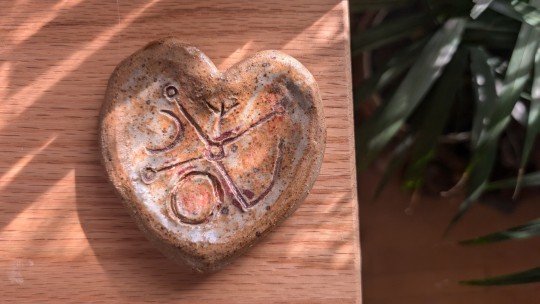
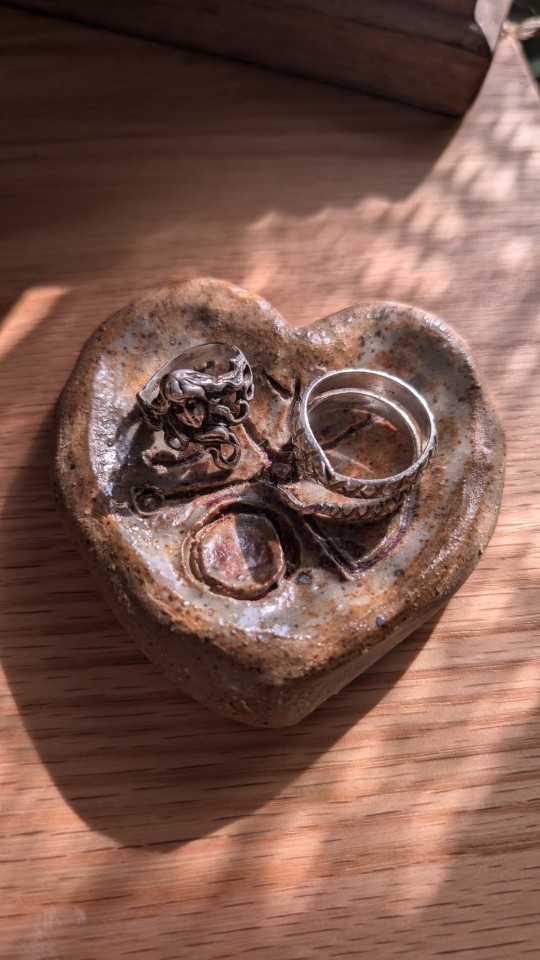
A Venus-Alphard talisman I crafted from earthenware clay, sometime last year during a particularly beautiful transit of the Fairer Benefic. I love the way the green glaze turned rust red in places, a beautiful manifestation of this degrees serpentine spirits.
This tray is used by my partner and I to hold our rings while we sleep. A ritualized placing of our love in the hands of Venus and the spirits of my cultus.
33 notes
·
View notes
Text
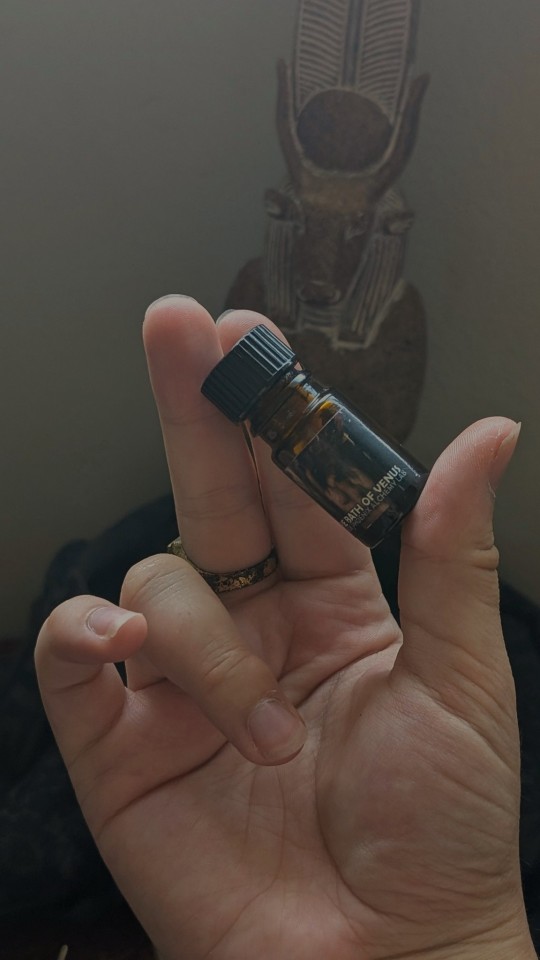
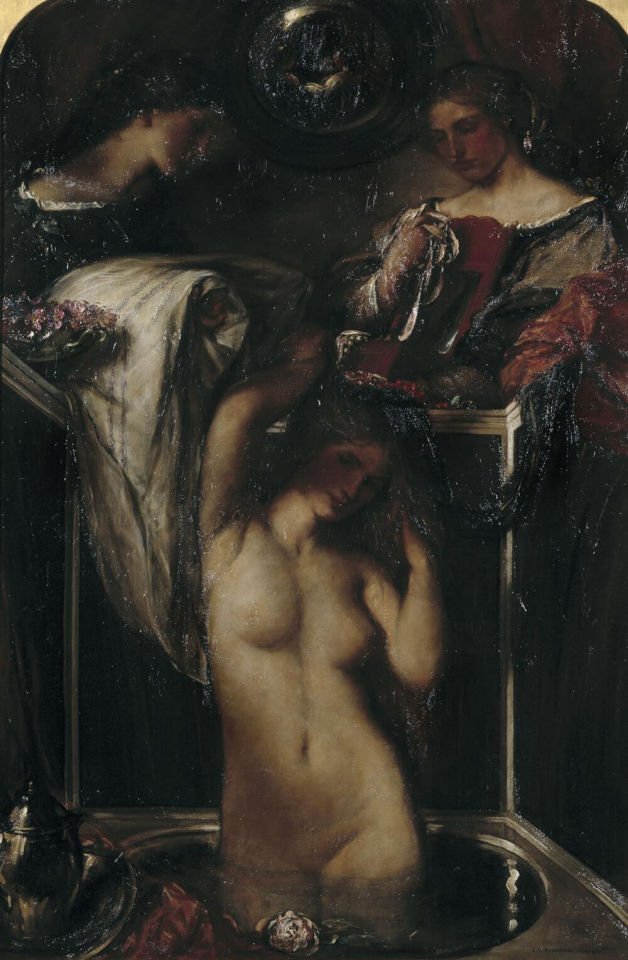
Feeding my new eikon with a favorite perfume of mine, Bath of Venus by Black Phoenix Alchemy. As this will be the centerpiece of my shrine as I work my way through the spells of the PGM, dedicated to She of love and magic, it felt only appropriate to drape her in perfumed scarves and ancestral garnets.
Bath of Venus has become a staple of my glamours and love workings, in no small part because its rich and spiced smell reminds me of Peruvian Agua de Florida if it were steeped in a milky tea. The formula, as described by its chemists:
Velvet rose petals, white silk, red benzoin, sweet black labdanum, honeyed wine, kyphi tar, scarlet amber, and frankincense-smoked carnation petals.
While I adore this potent, Venusian blend, it was a limited stock which has long since sold out. This bottle, my very last, is kept for occasions which demand the utmost Venus energy... Such as honoring a new divinity in Her new shrine.
10 notes
·
View notes
Text
The increased materialism of Venus in Taurus is going to put my Second House Scorpio Moon/Venus in the hospital... But at least I'll be surrounded by occult books and vampy lipsticks.
7 notes
·
View notes
Text
My mother saw a trusted spirit talker recently, in hopes of receiving some wisdom from our Beloved Dead. They came through brilliantly, they dictated the movement of their heirlooms and wishes, they conjured images of childhood homes and intimate moments.
I'm reminded, always, that the ancestors remain. They remain as unique voices within our home, voices which we'd be ignorant to disregard. They remain to ensure that their adur is dispersed within the family as they see fit. They remain to remind us of their love and support in our endeavors. This exchange has left me thinking much on the roles the ancestors played within my own anointment into the cultus, their encouragement and guidance, their eyes watching from within the Cave.
All this to say, chthonic movement is at times slow, and for my family has been a matter of relearning proper channels, but it is the movement most assured, the embrace most warm, the kindness most willingly paid.
21 notes
·
View notes
Text
Call For Testimonials
Hello dears. As I go through the slow, detangling practice of changing platforms I want to hear from you! If you've read my more formal work over on WordPress, or perhaps received a reading or bespoke ritual tool from me, sound off!
I am particularly interested in thoughts on my more formal, academic writings. With your consent these will be shared on the website to help promote my work to a wider audience 🤍🌻
As always, your continued support means everything to me!
-Otsana
3 notes
·
View notes
Text
Hot and Cool Spirits
A basic tenant of herbology is the idea that some herbs are heating and others cooling. Rooted in Chinese medicine, this belief holds ancient roots and has been used to cure issues of circulation, soothe fevers, and even been employed to aid against less physical ailments, like pervasive lethargy. Growing up, I was taught which herbs were ‘hot’ and which were ‘cool’, a fascinating dychodamy that felt both intuitive and scientific.
When I first moved to New Orleans it was not long before I came in contact with Vodouizans. By nature of where I was studying in the city there was a large number of Haitian students whose family observed these traditions and their children held close to these ideas. There was one girl in particular who I remember being deeply fond of the spirit Erzulie Freda, a popular lwa of love, beauty, and money. In my mind, it was her who I first heard the idea of a “cool” spirit from, though in truth it has been many years and I do not recall with clarity. I was immediately taken with this idea, that spirits operate in a similar medical ecology than that I had been raised with. Within Vodou, this manifested as the nations of spirits known as lwa. In many times this manifested as due to the history of that spirit family, at other times they were grouped because of this seemingly shared nature. In the case of Erzulie Freda, a Rada lwa, she was a cool spirit. However, her sister Erzulie Dantor was honored as a queen within the Petro nation, a very hot family of spirits.
As a reflection of my own practice, I work with a typically very hot family of spirits. Not only does this reflect my living Basque family, which is loud and boisterous and fierce in their form of love, but it also reflects the fiery and chthonic nature which our gods took in pre-christian times. Diviners who have worked with me over the years have described my family of spirits as leaving them fevered or sessions ending in a flash of heat. Likewise those few who have been in my presence during theurgical spellwork or received healings from me have experienced it as an intense heat which burns away the impurities but leaves them sweating and often physically drained. A quirk of my magic deeply tied to the particular spirits who enact it.
Thinking about spirits in this way I believe to create a holistic way of understanding the medicines behind the spirits we work with. Where they thrive and where another hand may be better suited. While this practice may not be applicable in many European practices, within the context of my own it has found a fond home as a method of self-understanding. Likewise, experimenting with exactly which epithets call upon the Anderexo and her consort in hot or cool manifestations has allowed me to improve and improvise my healing style from a technical-theurgy side which feels uniquely apt to a revivalist practice. If nothing else, it provides an interesting outlook into the ways in which medicines and spirits interact and intersect!
110 notes
·
View notes